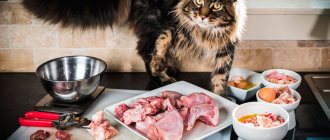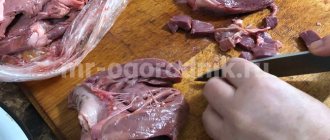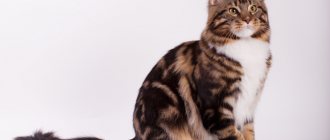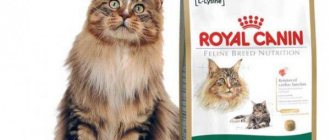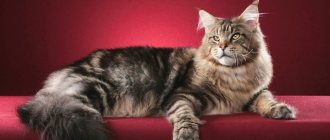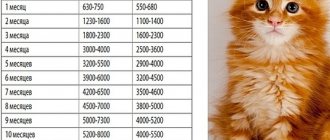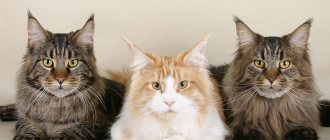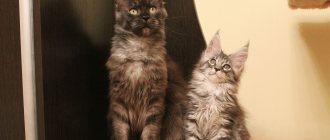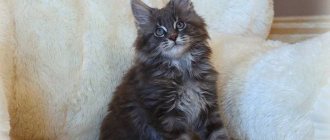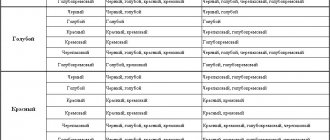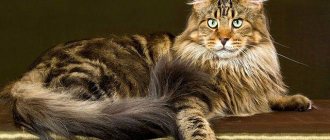Maine Coon cats are special. They differ in size from other domestic cats, body structure, developed muscles and a longer period of development. Therefore, nutrition must meet their needs.
There are most myths about the breed regarding weight and height. Maine Coons do not suffer from obesity, unless the owner, to please his whim, deliberately feeds the pet a lot so that the cat grows big.
Natural nutrition
Many owners conduct experiments on feeding Maine Coons, trying to grow the animal large. However, most breeders agree that it will not be able to develop correctly when dried. And if the question arises of what to feed a Maine Coon so that it is healthy and gains muscle mass, preference is given to natural food.
The breed is active and energetic. This leads to the rule that the balance of nutrients and energy value is important in the Maine diet. However, in practice this is not easy to implement, especially for novice horse breeders.
Meat menu
Maine Coons are carnivores, like all cats. They need meat. With proper nutrition, it makes up at least 50% of the diet, ideally 80%. The remaining 20% are additives in the form of fermented milk products, cheese, vegetables, eggs.
It is better to feed the animal the following types of meat:
- beef;
- mutton;
- rabbit meat;
- poultry meat (red).
Even if there is complete trust in the meat seller, the product is still frozen for 3-5 days. Then the meat is thawed and served raw, after being cut into small pieces.
It is better if the Maine Coon's diet includes red meat (thighs, drumsticks) of chicken or turkey. Breast is low in calories and is more suitable for cats that are overweight and on a diet.
Offal is also included in the kunya menu:
- It is correct to feed a Maine Coon by adding pork and chicken hearts without fat. Beef is difficult to digest, and lamb may not be to your liking. The heart is the most useful of all by-products, so its share should be larger - about 40%. It is not soaked, but given along with blood.
- Bird liver. It is better to scald or lightly boil beef or pork liver so that your pet does not have an upset stomach. For one serving no more than a teaspoon of liver.
- Gizzards, beef tripe. The portion of tripe is limited, as it is very fatty and can cause loose stools.
- Chicken necks without skin, heads, combs. These products are high in calories, are a source of calcium and are a good teeth cleaner due to cartilage. They are ground in a meat grinder, beaten or finely chopped.
- Pork nickels. Good for ligaments and bones.
Another list of useful foods, but which should not be abused when feeding a Maine Coon:
- Kidneys – contain vitamin A, but it is important to avoid overdose.
- The udder is a source of easily digestible protein. In large quantities, it is harmful to the liver, can contribute to the development of obesity and cause diarrhea.
- Milk thistle meal is an ingredient beneficial for the liver. They season food with it. You need to take a break - a week after a week.
Fish and seafood
It is permissible to include sea fish in the Maine Coon menu: 2-3 times a week and not as the main portion, but more for variety. You can feed boiled or raw cod and salmon. Maine cats and squid, even dried ones, love shelled shrimp.
For nursing cats
In the first month of life, kittens receive proteins, fats, carbohydrates and other elements necessary for growth and development from their mother’s milk, so the cat’s diet must be composed of foods containing high amounts of these components. The menu should also include bone meal (1 tsp daily) and fish oil (once a week). The portion size should be increased by 3 - 4 times, and the frequency of feedings should be increased to 5 - 6 times a day.
To ensure good lactation, one third of the menu should consist of dairy products.
Method for preparing kunin porridge
Many owners believe that the best option for feeding a Maine Coon to gain weight is marten porridge.
This is a serving method that involves mixing various natural ingredients. Each Maine Coon owner can create the recipe himself, depending on the preferences and weight of his pet. All ingredients are crushed and mixed in one bowl. Sour milk, cottage cheese, cheese, eggs and butter are added immediately before feeding. The porridge is prepared, put into bags and stored in the freezer. Before feeding the cat, defrost it and bring it to room temperature.
Sample recipe for kunin porridge (can be done by eye or weighed):
- 1 kg each of beef, chicken necks, pork hearts. Chop the necks, cut the meat into small pieces of 2 cm.
- 0.8 kg – chicken hearts. The fat is cut off.
- 0.5 kg – chicken stomachs.
- 0.4 kg – carrots. Simmer in vegetable oil until soft.
- 0.2 kg – beef liver. Cut into small pieces of 1 cm.
Animal growth
Up to one year of age, kittens develop quite rapidly. By three months, the baby already exceeds the performance of some adult cats of ordinary breeds. In general, the size of a pet depends on many factors.
Important! You should not be upset if the animal does not meet the development standards, but you should still be careful. There is always the possibility that the breeder sold a crossbreed instead of a purebred Maine Coon. When choosing an animal for your family, it is best to contact an official nursery.
How to switch to natural
If a decision is made to change the diet and feed the pet not prepared food, but natural food, the transition is smooth.
When changing the diet, veterinarians advise introducing probiotics into the cat’s menu. One of these drugs is the dietary supplement Vetom.
A pet may resist change, but the owner must be persistent and patient. The maximum limit of a hunger strike (according to owners’ reviews) is 5 days. Then the animal gives in and starts eating. There are often cases when during the day a cat turns his face away from the bowl, and at night he eats every single piece.
At first, the cat is offered only meat. If the pet begins to eat it well and there is no bowel disorder, another ingredient is introduced, followed by a third after 2-3 days. Products containing bones (chicken necks, heads) are added last.
Vitamins and minerals
For normal growth and development, Maine Coons need vitamins and minerals. Cats that eat ready-made formulas receive useful substances from their food. Therefore, their owners should not buy additional supplements. Owners of pets who eat natural food should take care of the presence of the following substances in their diet:
- vitamins A, B, C, D, E, K, H;
- potassium;
- magnesium;
- calcium;
- gland;
- iodine;
- sodium;
- phosphorus.
The listed compounds are found in small quantities in homemade food. But this is not enough for the normal functioning of the pet. To supplement the Maine Coon's diet with vitamins and minerals, you can use vitamin and mineral supplements for cats:
- Kitty's Junior - for kittens over 1.5 months;
- AniVital - for healthy skin and shiny coat;
- 8 in 1 Excel Brewer's Yeast - a universal vitamin and mineral supplement;
- Cat Mineral Tabs - to strengthen bones and teeth;
- Veda - for castrated and sterilized animals;
- Sanal Senior Lecithin - for older cats over 7 years old;
- Unitabs Mama + Kitty - for pregnant cats and kittens.
Interesting! Dry yeast is a natural source of vitamins, proteins and amino acids. They can be added little by little to the usual Maine Coon dishes - the effect is comparable to the effect of expensive vitamin complexes.
When choosing vitamin complexes for Maine Coons, it is necessary to take into account the animal’s gender, age, diet, and health status. Therefore, it is better to consult a veterinarian before purchasing. An excess of vitamins and minerals in a cat’s menu, as well as a deficiency, can negatively affect its health.
Ready-made feed
Owners choose dry and canned food for coons because it is easier. There is no need to monitor the balance of minerals and vitamins. In theory, this is done by the feed manufacturer. In any case, food from the shelves of regular supermarkets is not suitable for Maine Coons. These should be croquettes, premium or super premium canned goods.
A number of popular brands:
- Orijen
- Acana
- Applaws
- Bozita
- Royal Canin Maine;
- Eagle Pack
- Nutra Gold
Small Maine Coons (up to a year old) can only be given kitten food, both dry and canned. When they are introduced to granules, they are soaked for the first time so that the baby does not injure his gums.
Croquettes are good because they do not spoil while remaining in the bowl. There is enough canned food for the cat to eat a portion at a time. Typically, the daily dose consists of 75% dry food and 25% wet food. Exhibition animals are fed a 50/50 combination of canned food and pellets.
What not to give to a Maine Coon
The animal's diet should be varied, but there is a list of foods that are prohibited for Maine Coons:
- chicken bones;
- fatty meats, such as pork;
- spicy, salty, smoked foods;
- chocolate, sugar and other sweet products;
- potato;
- beans.
What you should not give to a Maine Coon. It is also prohibited to give the animal spices and any medications intended for humans. This can lead to an overdose, and, as a result, the death of the coon. A balanced diet is the key to your pet’s health for many years.
What to feed a kitten
The first month after birth is one of the most important stages. The kitten feeds on its mother's milk, but is already showing interest in the cat's food.
I'm starting to feed my one-month-old kitten. They give you some ground meat. But the amount of food is insignificant - no more than 10-20 grams. in a day. At 1.5 months the dose increases 5 times.
The main component in the diet of a growing Maine Coon kitten is protein. Its absence or insignificant amount is the main reason why the Maine cat does not grow.
Pregnant cats
If a cat's diet is based on industrial food, then during pregnancy it should not be switched to natural products. You just need to purchase food designed specifically for pregnant and lactating cats, the composition of which is designed taking into account all the body needs of the future mother and kittens. If the animal’s diet consisted of natural products, some changes must be made to the menu by excluding fish, beets and cabbage from it to minimize the load on the kidneys and the likelihood of intestinal upset and adding milk.
At the beginning of pregnancy, you need to feed your pet twice a day, slightly increasing the usual serving size, in the middle - three times, doubling the amount of food, and before giving birth, increase the number of feedings to 6 times a day.
After consulting with a veterinarian, you should additionally give your cat a vitamin and mineral complex.
Character, behavioral characteristics
Maine Coon cats amaze with their appearance, grace, combined with restraint and nobility. Animals have a strong character, are smart, very self-confident, and have a sense of self-esteem. They are active, mobile, willingly play with their owners, and love walks. The breed's characteristics are good nature and lack of aggressiveness.
Learning ability
Maine Coons have highly developed intelligence. They are easy to learn and understand everything perfectly. Animals have excellent hearing and excellent memory. They can be taught to walk on a leash, perform various tricks and even swim.
Attitude towards people
They are very independent, but they become very attached to their owners. However, they will not impose their society, but will simply stay nearby. They don't like to sit on their laps.
They show tact and delicacy towards their owner and are very responsive to affection. They are non-aggressive towards strangers, but cannot tolerate familiarity. They are friendly towards small children; moreover, they are natural nannies and willingly accompany the child in games.
Attitude towards other animals
Males do not need to be isolated from kittens; they, like females, raise the babies. Representatives of this breed get along with dogs and other cats without difficulty. The exception is rodents: Maine Coons have an excellent hunting instinct.
Breed Features
Maine Coon translated as “Maine raccoon” (Maine, USA). The weight of an average male is from 6 to 8 kg, females - 3.5-5 kg. Often individual specimens reach 12 or even 15 kg.
These animals are not only the largest among felines, they:
- energetic;
- mobile;
- excellent hunters;
- have a huge fluffy tail and tassels on the ears, a strong skeleton and muscle corset, a wide skull;
- have semi-long hair.
All these features are reflected in feeding. To maintain life potential and health indicators (energy, fur quality), you need not just cat food, but a high-quality diet. Often when taking such a kitten into your home, problems arise. Reviews indicate that animals constantly ask for food. They scream angrily and demand food.
Looking at the characteristics of the breed when preparing the diet, you should make sure that it is:
- balanced;
- with optimal protein content;
- without a predominance of carbohydrates (does not contain grain base, soy and cereals);
- with easily digestible fats (as a source of fat-soluble vitamins);
- rich in mineral components.
Unbalanced and low energy value contributes to overeating, which should not be allowed.
Industrial food for Maine Coons super premium and holistic
First, the good stuff. When buying super premium or holistic food, you don’t have to think about the quality of the raw materials and the balance of the composition - the manufacturer takes care of this. Such feed uses natural meat and offal, and the entire technological process is carefully controlled.
Among holistic food brands, we can distinguish such brands as Acana, Go, Orijen, Arden Grande. These foods are universal: suitable not only for cats and male cats of any breed, but also for kittens of the most tender age. The philosophy of holistic food emphasizes that its quality is so high. That not only the pet, but also the owner can eat them.
Super-premium food often includes special lines for Maine Coons, which take into account the special needs of this breed - large size, long thick coat
Among these foods, pay attention to Royal Canin, which allows you to select nutrition not only taking into account the breed, but also the age and health status of your pet. There is also a line of specialized medicinal feeds
Of the minuses of the food, we can only say that it is produced in Russia. This fact worries many picky fans.
Bosch Sanabelle produces dry food for large breed cats, which undoubtedly includes Maine Coons. So this food will also be a very good option. European production (Germany) speaks in favor of this food. However, not every store has it in stock, and delivery outside the Moscow Ring Road can be expensive. The situation is similar with Swedish-made Bozita food - high quality, but limited availability. Most often, these foods can be bought in large pet stores in Moscow, St. Petersburg and some other large cities.
Residents of the province will have to choose from more affordable, but therefore no less high-quality food that does not have specialized lines for Maine Coons: Hills, Iams, Eukanuba.
ATTENTION Often the individual characteristics of an animal are more important than the brand of food. And the same food, ideal for one Maine Coon, can cause very unpleasant consequences for another. When choosing what food to feed your Maine Coon, focus primarily on the tastes, health, well-being and appearance of your pet
When choosing what food to feed your Maine Coon, focus primarily on the tastes, health, well-being and appearance of your pet.
You should not immediately buy a large package of new food. To start, try taking enough for a week. And during this time, evaluate whether there are any allergies, diarrhea, or whether there is an unpleasant odor from the mouth or from the tray. See if the cat is having fun. And only then can we conclude that this food is suitable for the pet and buy a larger supply. How to estimate the required quantity? The packaging usually indicates feeding rates depending on the weight of the animal, so we focus on them.
If you have chosen to feed natural food, this does not mean that you cannot treat your cat with natural meat, cheese, quail eggs or other cat treats from time to time. However, it should be understood. That there should not be a lot of such treats, no more than 5-10% of the diet. The dangers of “mixed” feeding have already been written above.
And further. There are foods that, despite the pitiful eyes, should absolutely not be given to cats. These are fried, smoked, spicy dishes, including sausages, prepared meat products such as boiled pork, lard and fatty meat, as well as sweets.
Diet from one month to six months
At the age of one and a half months, the amount of daily food is 150-200 g, which is distributed into six equal portions . At two months, low-fat dairy products such as cottage cheese, fermented baked milk and whole or diluted cream are used as complementary foods. Gradually, vegetable crops in the form of carrots, pumpkin, cabbage and zucchini, as well as greens and boneless ocean fish, are introduced into the diet.
Approximate diet for a two-month Maine Coon kitten:
- 25-35 g of meat and fish;
- 35-45 g of vegetables;
- 35-45 g of cottage cheese, kefir and sour cream;
- 15-20 g of porridge in water with added oil.
From the age of three months, the kitten is fed four times a day, but the daily food ration should be increased to 200-240 g. Particular importance at this age is given to meat, which is the basis of the pet’s diet. The amount of meat is at least 40-50 g per day.
It is allowed to use fully prepared dry diets intended for large breed kittens for feeding. It is important to remember that the kitten must always have access to clean drinking water.
